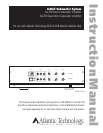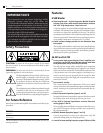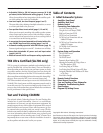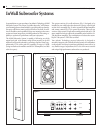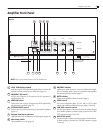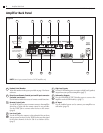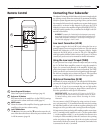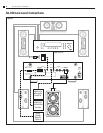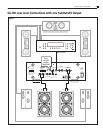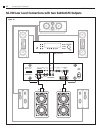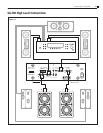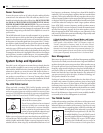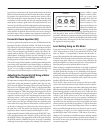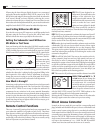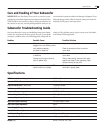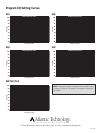
12
InWall Subwoofer System
Power Connection
Connect the power cord to an AC outlet only after making all other
connections to the subwoofer. This will avoid any chance of acci-
dentally activating the subwoofer while wiring. DO NOT PLUG THE
SA-350 OR SA-700 INTO THE SWITCHED OUTLET OF AN AM-
PLIFIER, PREAMPLIFIER, OR RECEIVER. The power demands
of these amplifiers is substantial and will exceed the power rating
of the switched outlet and may damage the equipment. Be sure that
the printed voltage rating on the back of the amplifier is correct for
your location.
The InWall Subwoofer System is totally automatic in its operation.
Once the main power switch on the front of the amplifier has been
turned on, the automatic on/off circuitry will activate the subwoofer
in the presence of an audio signal from your system. After 7-10 min-
utes with no signal detected from the rest of the system, the ampli-
fier will return to the Standby mode. When the sub is in operating
mode, the power LED located on the front of the amplifier will glow
green. The LED will switch to yellow in the Standby mode and power
consumption in this mode is negligible. When you leave for a longer
period of time, (vacation, weekend away, etc.) we recommend shut-
ting off the main power switch on the front panel of the amplifier.
System Setup and Operation
Since this is an in-wall system we assume that you already have the
woofer modules installed in your room as per the guidelines pro-
vided with the InWall Enclosure. Generally speaking, the closer the
subwoofer is placed to a corner, the more and deeper the bass re-
sponse you will hear. However, in some rooms, corner placement
can produce too much bass or a “one note” boomy effect. Should
you find this to be the case in your room after installation, the built
in parametric EQ can be used to improve the situation.
The LOW PASS Control
When used with a complete THX Certified speaker system, the
InWall Subwoofer System LOW PASS control should be set at 80Hz
unless you are using a processor with its own built-in crossover. If your
processor is THX certified or has a built-in crossover, set the subwoofer
amplifier’s LOW PASS control to the THX/EXT setting. All THX certi-
fied satellites has been optimized to work
with an 80 Hz crossover point.
If your Processor/Receiver has no internal
crossover (a fairly rare occurrence these
days) the subwoofer’s crossover should be
used to optimize the performance of the
system, by ensuring that the subwoofer and
satellites produce a cohesive and well integrated sound “picture.”
Higher crossover frequencies pass more bass but can quickly begin
to sound boomy. They also make it easier to localize the subwoofer,
which is highly undesirable. Higher crossover frequencies may be
suitable, however, when using very small satellites that have no real
low frequency performance. Settings lower than 80Hz should be
employed if you are using larger speakers that have extended bass
response. This way, the subwoofer will only reproduce the very low-
est bass frequencies that are in the range where the large main speak-
ers begin to roll off. It’s generally undesirable to have the main speak-
ers and the subwoofer overlap too much. Larger speakers means a
lower LOW PASS crossover frequency, smaller speakers means a
higher LOW PASS crossover frequency. Consult the manufacturer’s
specified low frequency response for your main speakers to deter-
mine the appropriate LOW PASS setting on your subwoofer. In the
end, however, a little time spent experimenting will generally result
in dramatically better bass response.
A Word About Bass, Center Channel Modes, and System
Setup Many Dolby Pro Logic surround processors and surround re-
ceivers provide a choice between “Wide” (full frequency range) and
“Normal” (restricted low frequency) mode for the center channel
speaker. Atlantic Technology recommends that the center channel be
operated in the Normal mode when using a powered subwoofer. The
center channel speaker will sound more dynamic and the intelligibility
of the system will generally be improved when in the Normal mode.
Bass Management
Many newer processor/receivers offer Bass Management capability.
If yours does it will ask you to choose between Large and Small loud-
speakers during the system setup procedure. When speakers are set
to Large the processor/receiver assumes that they can produce full
frequency range sound, including very deep bass at fairly high vol-
ume levels. When set to small it assumes that the speakers are bass
limited and feeds the bass from that channel to the subwoofer. If
your processor/receiver offers this choice, all Atlantic Technology sat-
ellite speakers should be set to Small.
For those of you who may have heard otherwise, the choice of Large
or Small is not a matter of opinion, preference, taste, or based upon
the phases of the moon. So please ignore all the free and helpful
(and many times incorrect) advice and set’em to Small. In fact, the
vast majority of speakers on the market today should be set to small.
As a rule of thumb, if any satellite speaker in your system doesn’t
have a 10 inch diameter or larger woofer it most probably should be
set to small, as far as Bass Management is concerned.
The PHASE Control
A subwoofer operating out of phase with the rest of the system won’t
provide optimum low frequency performance. Also, the correct
subwoofer phase can enhance room acoustics. Since there is some
variation in the industry regarding phase, a PHASE switch that will
alter the phase of the subwoofer is provided on
the amplifier. It has 4 positions (0
°
, 90
°
,180
°
,270
°
)
for added flexibility. To set the PHASE control,
insert the supplied Atlantic Technology/Sencore
Test and Training CD in your CD/DVD player
and select the broadband bass test tones on
Tracks 22. Have someone sit in the prime listen-
System Setup and Operation
LOW PASS
80
50 150
THX / EXT
PHASE
0 270
90 180



